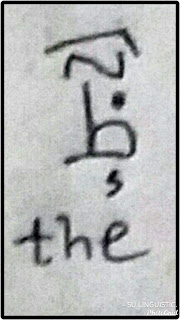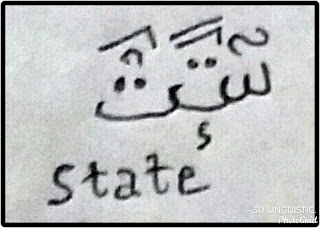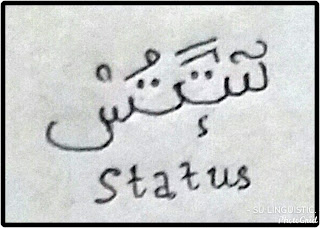Make a Historical Methodology as Part's Posts in Balance Sheet (Part I : Proposal of "Perspective to Constructive Concept According Deconstructing Process to the Early Understanding of My Writing as Photographs")
Make a Historical Methodology as
Part's Posts in Balance Sheet
<Part I : Proposal of
"Perspective to Constructive Concept According Deconstructing Process to
the Early Understanding of My Writing as Photographs">
Written by : Yusni Tria Yunda, S.Pd.
Author : Yusni Tria Yunda and Yusni
Tria Yunda, S.Pd.
Might be there were a few of
writings those being got starting from a main question: "how does the way
to doing a comparing research of knowledge inter-disciplinary[1]?".
Along the writer has knew; the think mentioned about research of knowledge
intern discipline was still being a rare things, and especially if the think
which has be an object nor some objects in research were the experiences from
the researcher own self. This issue may has be response by the writer, and
perhaps this writing could be filled in to the main problem as a real
contribute from any other thinking maters later: to taking up a method of
solving, as the way which being solutions from specify view of own self.
Why does the writer takes interdisciplinary
research issue as his main kind of problems background to chosen in this
proposal?,- whenever psychological with words "might be", the writer
shows indeed his orally unsurely about "were out there any other research
saying the interdisciplinary issues which could being a sample for this
research of him,- does the limited samples which being conditions those has to
front up by the researcher gives a good chance to this writing to give back a
certainly input thing?. The problems identification could be finding by giving
a certainly answers to the both of questions above. First, the writer is
choosing the main kind of problem's background which takes up an interdisciplinary
research issue because his searching and experiences about the linear disciplinary
research are much over found rather than the interdisciplinary, so that the
least is be his option to takes by him as it does. Second, the certain samples
which rare, of course gives a good chance for the writer to doing researching
with the conditions as it does, indeed.
----#
Simkuring aya emutan perkawis tilu
kecap-kecap dinu ka-hiji <"first">. Upami ngabandingkeun lajeng
ngadu-maniskeun antawis kecap-kecap husus kalih kecap nu ilahar atanapi umum,
numana "<...>interdisciplinary research issues<...>",-
dipitaros naha entepannana henteu "interdisciplinary issues
research", atanapi henteu "research interdisciplinary issues"?,-
sanes kanten sakedahna diuihkeun kana hartos nu dikandeg ku pangartos wiwitan
samemeh diserat munggaran.
Pangartos nu maos panginten tiasa
janten benten sareng pangartos dipimaksad ku nu nyerat. Perkawis ieu dumasar
kana pangartos istilah husus kalih istilah ilaharna kecap. Sapertos kieu: Aya
tilu grup; Grup A, B, sareng Grup C.
Grup A nyerat
"Shrink-Cost".
Grup B nyerat
"Shrink-Cost-Post".
Grup C nyerat
"Shrink-Cost-of-Post.
Upami ditarjamahkeun kana Bahasa
Indonesia atanapi oge kana Basa Sunda, kinten-kinten kieu;
A. Biaya Susut.
B. Pos Biaya Susut.
C. Pos<na> Biaya Susut.
Cara C <nu nganggo
"of"> diperyogikeun upami diemut panginten teu acan tangtos
sakumna jalmi terang ku cara B, kumargi teu acan tangtos terang ku cara B
kumaha oge sareng A?,- samentawis pangartos tina A ieu nu langkung utami
sateuacan nerapkeun kanu B. Kukituna, kangge ngabantos ngudag pangartos ka B
teras A, saena dipasihan tanggara kecap panghubung, sapertos 'na',- nu dina
kaperyogian ieu tiasa dianggo kecap "of" dina Bahasa Inggris.
Dianggona "of"
ngajantenkeun sakumna jalmi nu maos ieu seratan mikahartos yen aya istilah
husus tina entepan dua kecap <"shrink-cost"> nu diadu-maniskeun
sareng kecap ilahar <"post">, ditangaraan ku "of".
Nya kitu oge rupina upami palay ngahartoskeun salaku "panalungtikan
antawis-papada-jalur-sapuhuan" atanapi "panalungtikan
interdisipliner" ieu tina Bahasa Inggris tiasa disareatkeun tina istilah
hususna heula, janten 'interdisciplinary research' salaku nu husus, kalih
'issues' salaku nu ilahar. Ari bentenna B.Inggris dina cara nyeratkeun, atanapi
"tehnik nyeratkeun"na nyaeta dibalikkeun <\>: pangartos nu
ka-hiji diseratkeun ka-dua, ari pangartos nu ka-dua diseratkeun wiwitan.
Dina kasus yen nu mangrupi pangartos
ka-hiji diwangun ku langkung ti hiji kecap,- samisal "interdisciplinary-research",-
kalih pangartos ka-dua kawangunna mung ku hiji kecap,- samisal
"issues", nanging nu nyerat gaduh sakaligus kagungan pangemut yen
bilih teu sadaya nu maos terang watesan hartos husus kalih nu ilahar, mangka
kecap panyambung "of" tiasa janten wates pangemutna <upami di na
tengah-tengah kalimah, sanes ditungtung kalimah atanapi ditungtung hartos>.
Aya seueur saena upami "of" dianggokeun, janten "interdisciplinary
research of issues", ngarah langkung merenah ka sawatara nu maosna.
#---
With the explains in generally
answer above, the writer has main points as a reason to writes with thats start
as his new basic point todays. Previous implicit style in the theme, that has
no any word to descripts the secondary knowledge which will be paired to the
primarily ones: history, - could represents by a general concept from the
secondary: Balance Sheet. However, the Balance Sheet being specify minded of
destination certainly to the concept from accounting knowledge. As soon common
peoples will know to this one, remind by the Balance Sheet of words.
----##
Anapon ieu, perkawis keureutan tina
kalimah judul proposal ieu: "<...> Parts of Post in Balance Sheet
<...>", upami ngemut kana cara ngentepkeun kecap-kecap kalih istilah
nganggo cara nu sapertos "of" dina bagean saqobla ieu, ilaharna tiasa
katawis yen nu janten istilah husus nyaeta "Balance Sheet",- nu mana
'belens sihit' ieu dijantenkeun hiji marimaos-istilah nu ngandeg pangartosan nu
nuju kalih parantos ilahar dina widang akuntansi. Pola nempatkeun
"of" di na "Post in Balance Sheet" sanes kanten rada benten
jeung "Parts in Balance Sheet of Posts".
* "<...> Parts of Posts
in Balance Sheet <...>" tiasa ngandeg hartos "Wadahna Pos-Pos
di na Balance Sheet" dina bagean-bagean", namung rada kirang merenah
larapna. Ieu kumargi ciciren maos <"reading-(of)-mark"> nu
mangrupi tilu siki titik <"..."> kanggo kecap-kecap nu aya di
na lebet sapasang kurung siku,- nyaeta '< >',- nu wiwitan <sateuacan
"Parts of <...>",- nyaeta "Historical Methodology as
<...>" teu dipalire,- kumargi upami mitelik malire ieu istilah
"Historical Methodology" salaku istilah nu ngajantenkeun dirina
wakalah atanapi ngawakilan "First Concept" <dina perkawis ieu
nyaeta elmu sajarah>, nu seja bade dijentrekeun kaayaan ayana
<"existence">na ku ayana kecap 'es' <diserat
"as"> nu ngandeg hartos "salaku",- ieu "as"
kirang merenah upami dilajengna ku "Parts of Balance Sheet of Posts".
Kedah diguar eusi di na lebet sapasang kurung sikuna.
** "a Historical Methodology as
Parts in Balance Sheet of Posts" tiasa mijanten <"could be",
"could being"> ngandeg hartos "Sahiji Cara Elmu Sajarah
salaku Bagean-bagean di na lebet Wadah Pos-Pos Naraca". Namung upami
nyandak babanding sareng judul nu diserat di na lebet seratan ieu: "a
Historical Methodology as Parts of Posts in Balance Sheet",- tiasa ngandeg
hartos: "Sahiji Cara Elmu Sajarah salaku Bagean-bagean tina Wadah Pos-Pos
di na lebet Naraca". Pangartos nu medal janten: "wadah pos-pos"
<"post"> ngagaduhan bagean-bagean <"parts">, nu
diantawisna, nyaeta "elmu sajarah" <"historical">.
Kukituna, pangartos ieu langkung jentre
upami diwangun ku kalimah nu dipertelakeun sakumaha nu aya di na
"reading-<of>-points" atanapi wates-maos dua bintang
<"**"> dina luhureun kalimah pertelaan sateuacan ieu;
"sahiji cara elmu sajarah salaku bagean-bagean di na lebet wadah pos-pos
naraca", ku kalimah B.Ing. janten "a Historical Methodology as Parts
of Posts in Balance Sheet" sapertosmana nu parantos diseratkeun ngawitan;
sanes ku "a Historical Methodology as Posts in Balance Sheet of
Posts" atanapi oge sanes ku "a Historical Methodology as post in
Balance Sheet of Posts". Ieu kumargi "Balance Sheet" nyaeta dua
kecap nu janten hiji istilah, sanes "Sheet of Parts" namung
"Balance Sheet of Parts". Ieu panempatan diantawis "as",
"in", kalih "of", tiasa ageung mangaruhanna kana wangunan
<"structure"> kalimah di antawis langkung ti dua kecap
<tiasa nyapadan ka "between">, atanapi di antawis nu langkung
ti dua istilah <tiasa nyapadan ka "beyond">, atanapi diantawis
kecap-kecap kalih istilah-istilah <tiasa nyapadan ka "amoung">.
Rupina mindo <"overmore than
onces", atanapi "twice-or-mores"> nu dilarapkeun dina
ngawangun <janten "restructure"> diperyogikeun kangge nalungtik
aya henteuna sababaraha kateuacan-merenahan kiwari < "imperfectly-in-present-time">
nu nuju numutkeun ku cara <"according-by (...way)"> nu atos
<"past"> atanapi kalih nuju <"past-continuing">
janten "parantos" <"has being"> dipidamel,- atanapi
didasarkeun kana <"based-on"> sahiji atanapi langkung tina
teori-teori batur anu mangrupi "ceunah" keneh, nu kukituna seja bade
diuji-larapkeun kasaluyuan-kasaluyuannana <"the-trues"> dina
praktek-praktek ku ayana panalungtikan <"research"> nu tiasa
diwartakeun <"report"> dina rupi hiji wangun karya seratan
kaelmuan <"ilmiah"> nu tiasa dipertanggel-walerkeun
<"responsibiliabled'> sacara objektif <'numutkeun kana
objekna'> nu tiasa oge dipaluruh leres henteuna
<"reviewable"> ku batur-batur nu tiasa nangtoskeun atos kalih
nuju akur henteuna kaayaan hasil panalungtikan perkawis objek nu dimaksad sacara
objektiv <"objective">.
Numana kangge kaperyogian eta kedah
tiasa dijaharkeun <"explicit"> ka sakumna saha bae batur-batur
<"anyone"> kalih langkung sae ka sadayana jalmi
<"public-audience">. Kitu rupina cara nu diajengkeun kangge
mikahartos etangan <"counts"> tina wangunan
<"structure"> seratan ieu,- nu seja kedah dipindo-wangun kangge
uninga kacaketan perhetangan <"scales"> antawis teori kalih
praktekna.
##---
The untold main sample of historical
methodology which the writer would take in here is the critical and heuristic's
steps in historical methodology's partition knowledge, especially the useful of
those steps both, in the orally history method,- as a variant from the other
history's methods. An orally history has some unique characteristics,- which it
make the orally history method be included in main early scope of history's
method. For a while throwing side a conventional main setting about: as legally
every history has to having literal writing sources such as a specify book, and
any other clearly data and a fact which have been wrote by some historians. And
in that richly history sources condition, the next researcher could be moreover
ease to produce some new thinks from the mater of those things. This kind of
condition, doesn't give a widely change to an oral history,- which could being
closed down the orally ones.
To keeping care both of them as the
same importance values as two treasures of "Historical Methodology"
as the theme means, so that the orally history and the literal history
samples,- should being the things which could be an input materials to the
posts of the balance sheet. An experience whenever the writer did it, will
going to talking in the content latter of this writing's theme. A perspective
to the constructive concept which will started, is can't does begin as soon as
directly, cause it is needing a process to deconstruct,- to the sample which
the writer will taking in here, even though the samples that purposed to is an
experiences giving from the authors their own self to the writer. So that a
theory or a main approach about this method from the previous researcher are
needed by the writer,- especially about what is the important thinks that
scoped by reconstructive concept?.
The writer has pre-assumption this
understanding to the concept of reconstructive is the main way to reaching the
nearest distances as the sub-theme includes it, and this is could being one
major problems of "Historical Methodology" as the theme means, so
that the orally history and the literal history samples, - should being the
things which could be an input materials to the posts of the balance sheet.
The think which has founded from
main problems identification is : "How does the writer making a thinking
about the perspective to his writing about the early understanding of
him?".
The writer’s pre-assumption think
those conditions of rarely sources and samples are the same thing between the
sample which the writer will going to writing to discussed in the content, and
the sample about interdisciplinary from the other research’s; those are the
things with have the same conditions of rarely,- so that the writer making them
as variables as nearby as written in the sub-theme from this writing. One part
which can makes the writer know the sampling condition is about page ii and iii from the sample that will going to taking by the writer; about
the essences of the writer’s early understanding to the author’s paper of
undergraduate’s thesis above :
"Pelusuran terhadap sumber-sumber sejarah primer yang berbentuk micro
film arsip surat kabar dari koleksi perpustakaan nasional RI sangat membantu
dalam tahap pencarian data-data yang relevan dengan penelitian skripsi ini, di
samping penggunaan metode sejarah lisan tentunya. Surat kabar, terutama yang
terbit di wilayah yang sudah dikuasai kembali oleh Belanda banyak memberikan
informasi mengenai perkembangan dalam Kota Bandung dan daerah sekitarnya pada
tahun 1946."[2]
Trying to translate by the writer
as:
"The searching to the primarily
history's sources with manifest by the micro film archives of newspaper from
the National Library of Indonesia Republic's collections are very helpful in
phases of searching data those are has a relevance ship with this undergraduate
thesis paper of researching, it of course were beside on the history method
uselly. The newspaper, priority over which has been published in the territory
that has been powered re-takeover by The Dutch most given information about the
develop-progress condition in Bandung City and surrounding in the year of 1946.
".
"Untuk sumber lisan, penulis bukannya tidak menemukan
kendala di lapangan, melainkan sama sulitnya dengan penelusuran sumber-sumber
tertulis, bahkan mungkin lebih sulit lagi karena perlu juga melakukan
pendekatan psikologis dan menyesuaikan dengan kondisi fisik dan mental para
narasumber yang diwawancarai, di samping menggunakan pola pikir kritis.
Meskipun sulit namun berkesan, kegiatan wawancara telah memberikan pengalaman
pribadi berusaha untuk dapat menempatkan duduk permasalahan secara proporsional
berdasarkan berbagai keterangan yang sebenarnya cenderung subjektif, serta
menghubungkan berbagai kesaksian yang terpenggal-penggal dari berbagai
narasumber.".[3]
Trying to translate by the writer
as:
"For the orally source, the
writer wasn't no found any problem in the field, but the same as difficultly
with the searching to the literals sources, even might being overmuch difficulty
with the searching to the literal source, even may been moreover difficult ones
first, it cause needed also to did the psych approach of and adaptable with
mentally and psychologist condition of the respondents whose be interviewed,
beside on use of the critical thinking pattern. Even though difficult but has
impression, the interview activities has been gave a private experience try to positioning
the specify problem proportionally according various information those indeed subjectively
inclined, and to make connection from some various severed testimonies of some variant
respondents. ”.
___
History of editation;
1st editing: 03/08/2018, Isya's time, certain: at word: "Methodology" with link connecting.
History of editation;
1st editing: 03/08/2018, Isya's time, certain: at word: "Methodology" with link connecting.
[1] to comparing the words structure of “discipline” and
“psych”.. in English as Indonesian equal word, tre witer has been use this
online dictionary below; https://www.google.com/search?client=firefox-b-ab&ei=9TVrWvpFhtu-BKC7qIgP&q=disiplin+%28in+English%29&oq=disiplin+%28in+English%29&gs_l=psy-ab.3..0i7i30k1j0i7i10i30k1j0i7i30k1j0i7i10i30k1j0i7i30k1j0i7i10i30k1j0i7i30k1l3j0i7i5i30k1.389920.393383.0.396567.9.9.0.0.0.0.675.1892.0j6j1j5-1.8.0....0...1c.1.64.psy-ab..1.8.1889....0.MQqfzOyOzCc
[2]
Attached from : Yunda, Tria Yusni.
“Peranan Badan-Badan Perjuangan di Distrik Buah Batu pada Masa Revolusi
Fisik: Pertempuran di Desa Sapan dan Cijawura, Agustus 1946”. Paper of
undergraduate’s thesis. Program Education of History, Social Science Education of
Faculty, Indonesia University of Education. Bandung. 2007: Pages ii.








Comments
Post a Comment